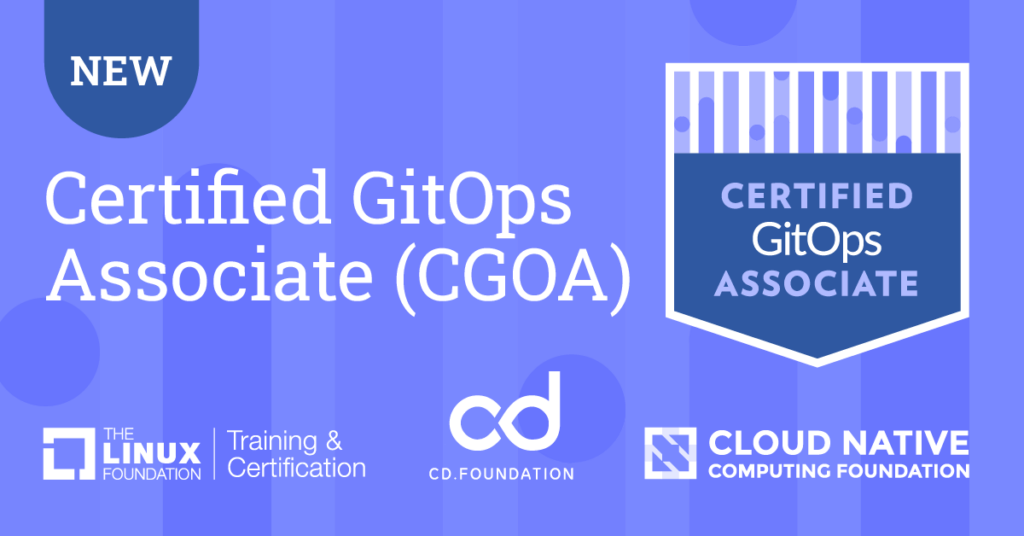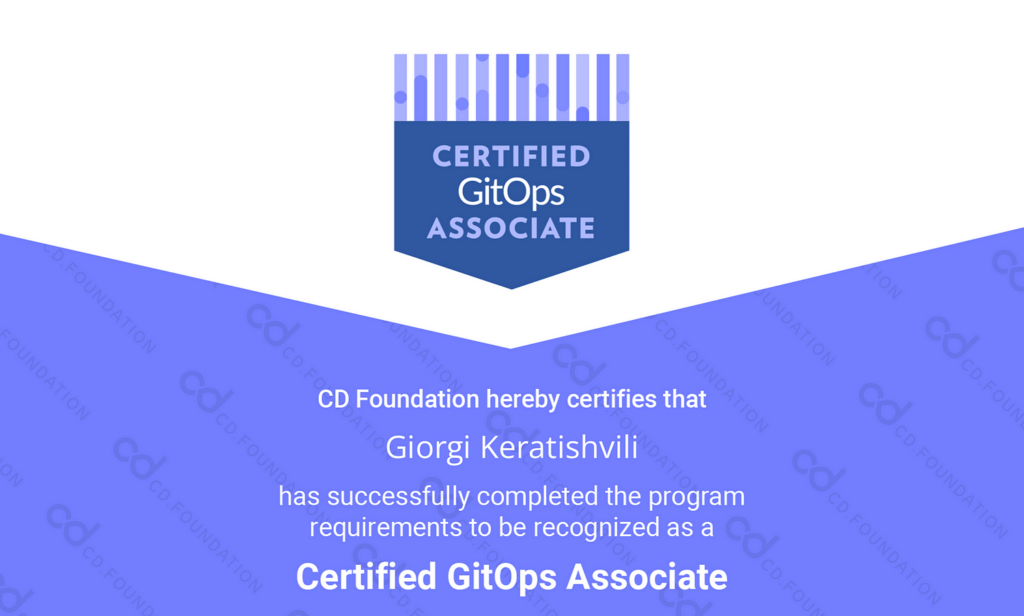Contributed by Giorgi Keratishvili, CDF Ambassador, originally posted on faun.pub
So you want to pass the Certified GitOps Associate Exam (CGOA) exam, but you’re not sure where to start? Don’t worry as one of the beta testers and exam creation contributors, I can help.
In this post, you’ll find out what to pay attention to and what to expect in the exam. First, let’s start with the exam format and difficulty level.

Who should take this exam?
Certified GitOps Associate is a multiple choice, 90-minute, online proctored exam.
The main theme of this exam is to emphasize OpenGitOps standards and give candidates an understanding of concepts, structuring repositories, and general patterns of what to look for while keeping everything vendor-neutral. (This was the difficult part for us creators because debates on the best tools could get quite heated.)
What’s in the exam?
Let’s discuss what is included in the certification’s Domains & Competencies
GitOps Terminology 20%
- Continuous
- Declarative Description
- Desired State
- State Drift
- State Reconciliation
- GitOps Managed Software System
- State Store
- Feedback Loop
- Rollback
GitOps Principles 30%
- Declarative
- Versioned and Immutable
- Pulled Automatically
- Continuously Reconciled
Related Practices 16%
- Configuration as Code (CaC)
- Infrastructure as Code (IaC)
- DevOps and DevSecOps
- CI and CD
GitOps Patterns 20%
- Deployment and Release Patterns
- Progressive Delivery Patterns
- Pull vs. Event-driven
- Architecture Patterns (in-cluster and external reconciler, state store management, etc.)
Tooling 14%
- Manifest Format and Packaging
- State Store Systems (Git and alternatives)
- Reconciliation Engines (ArgoCD, Flux, and alternatives)
- Interoperability with Notifications, Observability, and Continuous Integration Tools
As you can see, a big percentage was given to general Principles and Patterns/Terminologies as they are crucial to understanding in which cases GitOps can help, where it sits in Continuous Delivery, and how it differs from traditionally deploying applications and CI/CD.
For experienced people who have been using GitOps for a while, this exam should be intuitive and the majority of the questions will relate to their day-to-day tasks. But what if you are new to all that jazz? In this case, you need to fill in the gaps and dive deep into the world of the cloud native ecosystem and GitOps. The best place to start exploring would be the OpenGitOps documentation.
- Declarative: A system managed by GitOps must have its desired state expressed declaratively.
- Versioned and Immutable: Desired state is stored in a way that enforces immutability, versioning and retains a complete version history.
- Pulled Automatically: Software agents automatically pull the desired state declarations from the source.
- Continuously Reconciled: Software agents continuously observe the actual system state and attempt to apply the desired state.
These four Pillars are fundamentals similar to the “10 commandments” based on these principles. The whole philosophy is built around what is shared across all GitOps tools. Sounds cultish doesn’t it? All jokes aside but this approach and consistency helped to shape current approaches to how we deliver our deployment and management component most simply and easily on a large scale which fits well in the Kubernetes ecosystem.
Where do I find resources?
Okay, at this point we are excited and want to rush into the exam but how should we prepare, especially when we have no experience?
Documentation is our best friend. Let’s start with the tools that started this whole GitOps and Progressive Delivery movement.
FluxCD has a great introduction to general concepts and patterns on how to structure GitOps delivery. The other two you should check out are: ArgoCD and Jenkins X.
Beside documentation, the Linux Foundation also provides free training materials. It’s also very important to practice before taking the exam. I would also recommend checking GitHub for study guides like this one or other online resources.
What if you prefer to watch videos? My favorite place to go is the CNCF YouTube channel. They always upload the latest conference videos from KubeCon + CloudNativeCon or GitOpsCon. But, be careful not to get stuck in the YouTube rabbit hole. Remember practice is everything—not watching someone else.
Make a plan
Before starting this journey, I would select a target date for when you’d like to take the exam. From then on, schedule time to study seriously up until then. That’s one of the things that helped me the most.
Exam day
So it is exam day, what will it look like?
All Linux Foundation certifications are online and proctored. One hour before the exam, check all prerequisites and ensure the PSI browser plugin is installed.
30 minutes before the exam, the “Join” button will appear. Start your exam early, because there are always some unforeseen issues—I’m saying this as a person who has passed more than 15 PSI proctored exams. There is always something new in the room.
The most important thing is to have a good chair. A few times, I did the exam from my kitchen table and it was not comfortable.
What to avoid ⚠️
You should not have any posters or whiteboards in your room. Your desk should be clean with nothing extra on it, only your laptop or PC keyboard and mouse—that’s right, no pen, notebook, or anything! Proctors are very serious about this. You can of course have a glass of water or a tea with you to help you get through the 90 minutes.
You completed the exam
After you’ve finished the exam it will only take 24 hours for you to receive your results. To pass, you will need a score above 75%. If you pass, you will receive a Credly certificate.
You passed!

Congratulations, you have passed and obtained certification. I hope this post was informative. Take this as a sign to learn more and take on bigger challenges. There are many certifications from the Linux Foundation, CD Foundation and CNCF.
Stay curious and share your knowledge with others 🚀